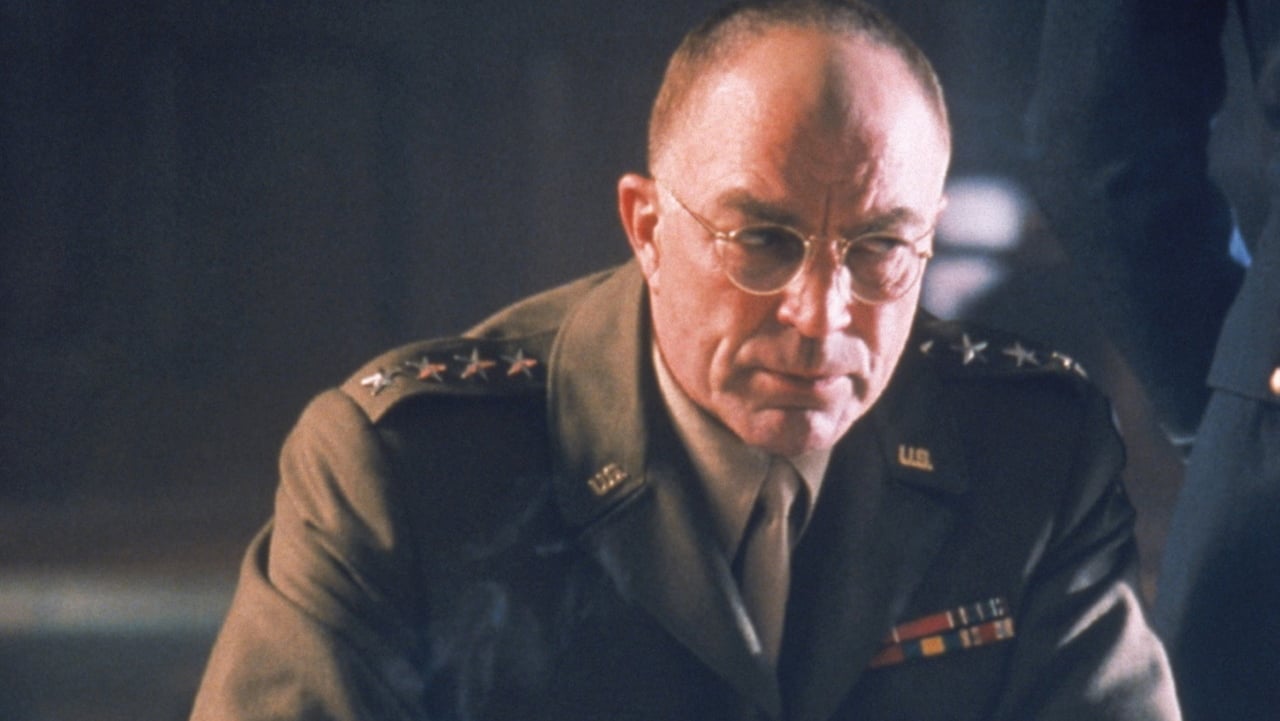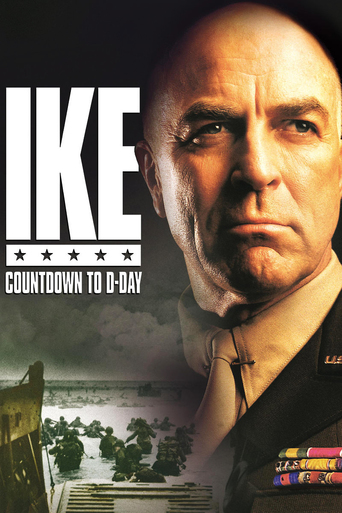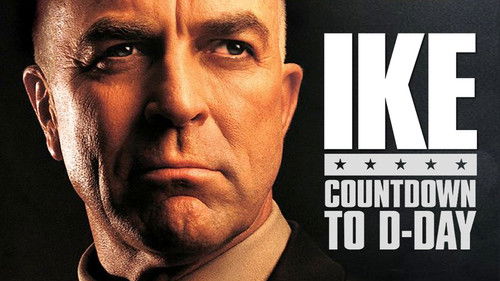


Tom Selleck stars as General Dwight D. Eisenhower in the TV movie entitled,Ike: Countdown to D-Day. It follows the General in the three months leading up to the decisive invasion that would turn the tide of World War II toward the Allied powers.James Remar,Timothy Bottoms,Gerald McRaney and Ian Mune co-stars to play key supporting roles.It is directed by Robert Harmon.The D-Day invasion is the largest military operation of World War II.The TV movie opens with Winston Churchill appointing Eisenhower,better known as Ike, as the Supreme Allied Commander. He faces conflicts with British General Montgomery, American General George Patton, and French leader Charles de Gaulle.He must balance these men's egos as he organizes the risky but necessary military maneuver.Despite historical errors and inaccuracies,this TV movie is a very well done depiction of the events leading up to D-Day, headlined by one of the strongest performances of Tom Selleck's career. It manages to convey the sense of tension throughout every scene which is a testament to both the acting and the writing.
... View MoreI tumbled to this one as part of a large pruning-out of a friend's DVD collection, and although this one won't be a keeper for my own library, it was still a worthwhile watch, if only for the novelty of Tom Selleck doing an extraordinary job of portraying Dwight D. Eisenhower.Mr. Selleck, to be totally honest, looks nothing like Eisenhower, even with his head and mustache shaved, but just as Gretchen Mol strutted her stuff to great effect in "The Notorious Bettie Page," Mr. Selleck rises to the occasion and embodies Ike with a remarkable verisimilitude that allows his audience to ignore the physical discrepancy. It is definitely one of Selleck's shining moments as an actor.The script has its problems, but this is no surprise in a talking heads story about the concerns of mounting the largest amphibious invasion in the history of warfare. Certain events are shuffled about and compressed temporally, some are created out of whole cloth, and a few seem to be egregious mistakes (cf. Ike's chat with troopers of the 101st Airborne on the wrong day), but mostly it's all in service of the story. Within the context of a two hour made-for-TV docu-drama, it works. Complaint can be made about the portrayal of various persons, notably General Patton, Field Marshall Montgomery, and Charles DeGaulle (whose nose isn't nearly big enough), but these are all minor lights orbiting the main star, Ike. If nothing else, the film properly leads one to further exploration of the events chronicled; there is a wealth of information out there, needless to say.Selleck really does a bang-up job, reining in his Magnum P.I. persona almost completely to portray a man who not only had the weight of the world on his shoulders, but also carried its very fate in his hands. I think Ike himself would have been pleased.
... View MoreThere are no combat scenes in this wartime drama, yet it offers a compelling portrait of Ike and a gripping depiction of all the strategy meetings involved in the Allied landing in Normandy. I'm one of the few who has not yet seen Saving Private Ryan, and think this might be a useful movie to have watched first. The film chronicles the complicated planning meetings during the three month build up to D-Day, the operation masterfully orchestrated by the American General Dwight D. Eisenhower in his position as Supreme Commander of the Allied Expeditionary Force. Tom Selleck is positively brilliant in his portrayal of Ike. Like every other viewer, I knew what the real Eisenhower looked like but while watching this movie, I didn't see Tom Selleck or Magnum. I saw Ike. The movie gives a moving portrait of this confident and decisive but not egotistical general. Fortunately, it avoids any depiction of an alleged romantic affair with his chauffeur Sommersby, best not to cast needless aspersions. It especially provides a touching glimpse into this leader's inner turmoil, secret doubts, and emotional anguish at sending soldiers into a dangerous battle bound to involve high Allied casualties. The battle depicted in this film is truly Eisenhower's inner one.The most wrenching scene is definitely the one in which Eisenhower himself visits the paratroopers on the eve of the landing. As this group is expected to suffer especially high casualties, he realizes that he is undoubtedly sending many of them off to their deaths. However, given the dire wartime situation, he realizes he has no choice. His unpretentious friendliness with these paratroopers is touching as he tries to put them at ease, shares a cigarette with them, and shows genuine interest in their personal lives...uncharacteristic of a military commander in his position.The inner squabbling between the generals is also interesting, the various egos of those who disagree on strategy. It's obvious why there needs to be one leader with the final word! Ike exhibits both able tactical strategy but also admirable people skills, dealing respectfully with both the political leaders and the other generals, seeking their opinions, but unafraid to ultimately insist on his chosen course of action. Generals Montgomery, Patton, and Bradley are all highly involved in the planning operation. I'm no expert on the historical accuracy about any of these generals, so will leave such commentary to others better informed.Charles DeGaulle is certainly cast as an irritating, unsympathetic, and uncooperative obstacle to the Allies' plans, though some have commented that this depiction is inaccurate. Hopefully. While I hesitate to disparage the dead, he comes across as quite despicable here. Churchill is also shown of course, behaving very Churchillian!The planning operation of Operation Overlord makes a riveting story. I was especially taken with the operation's total dependence on the weather reports near the target date. The pressure must certainly have been on these meteorologists to get their forecast right! Sellick brought to life an historical figure I had previously really never thought much of, though Eisenhower must have been regarded quite heroically in public opinion for him so have gained such an endearing nickname. I hope his portrayal in this movie is accurate, because I would like to believe that Ike actually was in real life the very capable but unpretentious and compassionate man of integrity depicted here.
... View MoreI swear you come off feeling more sympathy for the Germans than the French after seeing this. There are serious omissions and out of context statements that portray the French in every which way possible in a negative light. Its so obviously tainted by current politics (and I'm sure Tom Selleck's conservative politics) its not funny. The one time in the show where Churchill makes the off comment about the French trying to impede their escape from Dunkerque. As if they were collaborating with the Germans at the time... Totally out of context I cant believe Churchill would've made that comment to Ike at all. It was probably completely made up for the show. See the great BBC docu series "History of WW2" for the context.The admiral in charge of French forces in the area at the time wanted to stay in the fight. He expected the Brits to fulfill their obligations in their alliance at the time and not abandon the field of battle. He didn't understand they couldn't fight on probably because being an admiral vs a land force general didn't help in his understanding the Germans had far superior tactics and there was no point in keeping up the fight and risk the capture of 400 000 allied troops by the Germans. The motivation was honest though not one of a backstabbing nature. The French admiral saw cowardice in his eyes. And he felt betrayed and abandoned by his British allies.But also the fact the French had to threaten the closure of the port (tho they had no means of really doing it) if the Brits didn't evacuate them on a 50\50 basis is a sad statement on the British leadership far more than the French leadership at the time. In the last days of the Dunkerque evacuation 100 000 french soldiers held the line while the remaining 40 000 brits got first dibs off the continent. Hows that for "surrender monkeys"? I seriously hope Americans will get a chance to see the BBC series dramatized documentary "History of WW2" and get a truer picture of what really happened. So that unlike the sad distorted comment by the main comment posted for this picture and the awful Ike program they can really get an honest perspective of what happened.
... View More